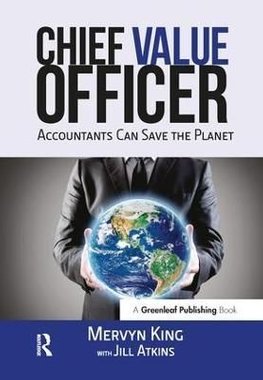Chief Value Officer: Accountants Can Save The Planet | The CPA Journal

This short book addresses the very important topic of how to save the planet, and it presents the ways in which progress on that goal is compatible with businesses creating value for themselves.
The book also highlights the importance of companies issuing financial reports not as financial statements, but as a method of reporting their value measurement and creation, using an integrated approach to include capitals beyond just the financial. Author Mervyn King also suggests that the most appropriate people to lead the charge are accountants, specifically Chief Financial Officers, who King says should be renamed Chief Value Officers.
Mervyn King is the godfather of the sustainability and integrated reporting movements and has generated worldwide recognition of these issues in corporate reporting and value creation. Anything he writes, as far as this reviewer is concerned, is a must-read.
The book begins by making the case for why conventional financial reporting should be transformed. The author’s logic is hard to defy, using as it does the history of the corporation and how the “ownerless company” emerged. The belief that shareholders are the primary owners of a corporation is overturned in favor of a company’s direct stakeholders, all of whom a company’s board needs to address.
Major Premises
The book lays forth the six capitals modern companies need to address: financial, manufactured, social, human, intellectual, and natural. All are important and require due consideration. Integrated reporting (IR) is a way that companies can disclose information relating to all of these capitals, sustainable development goals, and other targets that can lead to value creation over the long term. IR is a relatively new concept that is taking hold in some countries and larger companies. The author advocates universal adoption of IR, something this reader and many others, even those open to the concept, would stop short of suggesting. Rather, the book should serve as an introduction and a springboard to further study. Integrated reporting can and does lead to integrated thinking as a strategic business plan, with concomitant results.
Stakeholders are any parties who affect or are affected by a company, including shareholders, employees, suppliers, lenders, creditors, service providers, local communities, governments, and the natural environment. The stakeholders most able to diversify their involvement are the shareholders, who can spread their investments among multiple companies. Less able are employees, and least of all is likely the environment, which cannot speak for itself.
Accountants are the primary measurers, auditors, and designers of financial reports, and they can change reporting vehicles. There is no doubt of the centrality of the accountant’s role; however, the book limits itself by using accountants as the driving force. It should reach a much wider audience, and with small changes in that regard (and in the title) it could be directed to all corporate directors, CEOs, and CFOs, and professionals engaged by these organizations, as well as legislators and regulators.
New Concepts
It is important to explore new concepts that address not only the way companies issue reports, but also how they account for waste, sustainable actions, human resource management, natural resource conservation and replenishment, as well as how companies can establish, organize, and implement a mind-set and culture to assume social responsibility. Good citizenship requires awareness and actions promoting positive sustainability behavior; this book presents a way to start.
Given the issues the authors develop, this book is certainly required reading for all accountants, as well as the heads of each stakeholder group. Get it, read it, and think about the consequences of ignoring what is suggested.
You can learn more the book here.

